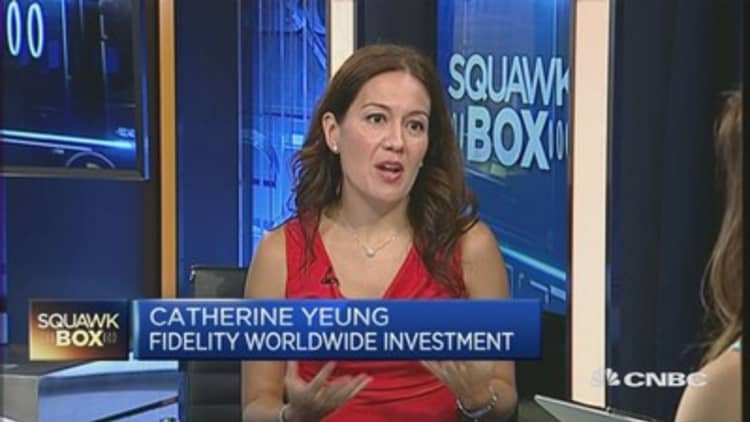China's all-important property sector may be finally bottoming out after a year-long slump, with official data on Tuesday showing monthly home prices climbed for a third straight month in July.
Nationwide new home prices rose 0.3 percent on month in July, versus a 0.4 percent gain in June and May's 0.2 percent rise. On an annual basis, July prices fell 3.7 percent, compared to the previous month's 4.9 percent slide, indicating the market could be in the nascent stage of a recovery.
The nationwide house price index is a weighted average calculated by Reuters, based on data from China's National Bureau of Statistics.
Once red hot, real estate prices dropped sharply from April 2014 to May 2015 amid oversupply and cooling demand, helping push economic growth to a six-year low in the first three months of the year. The home-building sector, including related industries such as steel and cement, contributes 25-30 percent to gross domestic product (GDP).
Read MoreWelcome to China's new 'managed float' regime
China has a two-speed real-estate market, where home demand in first-tier cities like Beijing, Shanghai and Shenzhen is recovering, while high inventory levels plague lower-tier cities. But as monetary stimulus kicks in, the overall market is showing signs of life again.
China's central bank has cut interest rates four times since late last year, on top of measures including reserve requirement cuts for banks, lower down-payment levels and bigger tax break for home buyers. More fiscal and monetary policies are widely expected in order to fend off a renewed slowdown.
But analysts remain cautious.
Structurally, the market is still going down due to supply-demand differences between big and small cities but government policies have helped the market bottom out in the near-term, Du Jinsong, head of Asia property Research at Credit Suisse, told CNBC on Tuesday.
"Going forward, how many more rate cuts can we have? In cities like Shenzhen and Shanghai, banks are tightening mortgage lending because home prices surged a lot, and we also have new housing purchase restrictions," said Edison Bian, head of China property at UOB Kay Hian, referring to home purchase restriction (HPR) measures in Beijing announced on Friday that require residents to have three years of local working experience before buying a second home in the Tongzhou district.

Bracing for a weaker yuan
A landmark decision to devalue the renminbi triggered initial capital flights out of Chinese property, but that trend is unlikely to last in the long-term.
The People's Bank of China (PBoC) devalued its currency by 1.9 percent against the greenback on August 11, sparking fears of excessive yuan declines. A free-falling currency typically sends worried investors rushing to park their money into offshore property hubs such as the U.S. and Australia.
But following the central bank's re-assurance last week that it won't allow dramatic depreciation, experts say a weaker yuan may not have a big impact on the property market.
Rick Sharga, executive vice president at real estate sales service Auction.com, told CNBC on Friday that while Chinese purchases of U.S. real estate did initially spike following the devaluation announcement, he did not expect it to continue unless the yuan significantly depreciated further.
The currency lost around 3 percent against the U.S. dollar since August 11, and was little changed at 6.3936 on Tuesday.
Read MoreYuan devaluation is completely meaningless: Faber
"A number of empirical market studies suggest that local currency depreciation against the major international currencies, such as the U.S. dollar and British pound does not necessarily lead to a downturn in the real estate market," Colliers International said in a report on Monday, referring to historical examples in Japan and Australia.
Moreover, currency depreciation won't alter the market's fundamental issue of oversupply, Colliers added.
But it's a different story for property developers.
A large portion of the U.S. dollar debt outstanding in China's private business sector has been issued by real estate companies and property developers, Credit Suisse noted in a recent report. "The principle payment on this debt has just increase by 3-4 percent and may be a headwind for real-estate projects."
Indeed, the renminbi's devaluation adds pressure to developers' projects, as well as their U.S. dollar denominated borrowings: they have to pay more renminbi to cover for higher financing costs, Bian of UOB Kay Hian noted.
On the bright side, the pain may be short-lived.
"I believe the devaluation will likely be a short-term issue for developers. For example, China Vanke has 20 percent of dollar-denominated debt, so the yuan devaluation could cut Vanke's earnings by 5 percent, but that will be a one-off," Dennis Yao, property and healthcare sector analyst at GF Securities Hong Kong Brokerage, told CNBC on Friday.
On Sunday, Vanke—the mainland's largest property developer—reported a 0.8 percent rise in net profit for the January-June period.
"But in the absolute worst scenario, further currency depreciation could cut earnings of developers by 20-30 percent," Yao warned.

